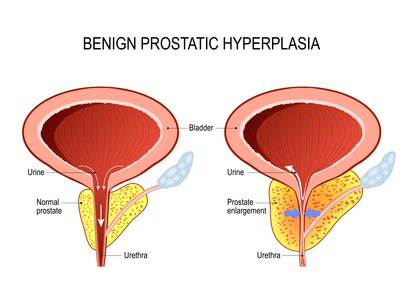Resource Guide - Enlarged Prostate and Natural Remedies
BPH or Enlarged Prostate
There are three things every man can count on: death, taxes, and an enlarged prostate. This is due to how common BPH is. It eventually affects almost 80 percent of all men. The most common symptoms are urinary and sexual difficulties. This gland is unique to men. One of the first signs that you are having an issue with your prostate is that you notice a reduced flow or stream and find it difficult to urinate. This may prevent some men from emptying their bladder completely. If this occurs they may wake up every 2 to 3 hours in the night to visit the bathroom. Some men develop prostatitis (an inflamation of the prostate) as a result of having a bladder that is unable to empty thoroughly. If you are experiencing enlarged prostate symptoms you know that they are frustrating and have a significant impact on your quality of life.
In addtion to treatment with presciption medications many men prefer and choose natural remedies and lifestyle changes.
Natural Prostate Remedies for an Enlarged Prostate
Pygeum africanum - (African Plum Extract)
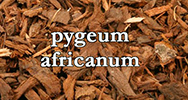
Pygeum is very popular in Africa and parts of Europe as a natural remedy for enlarged prostate. It contains a wide range of fatty acids, alcohols, and sterols. It contains the plant sterol beta-sitosterol which has an anti-inflamatory and an antioxidant effect on the urogentital tract. In a couple of clinical studies individuals that were given 100 mg and 200 mg of pygeum extract daily or in divided dosages (50 mg and 100 mg) twice daily may reduce BPH symptoms.
Due to illegal and over harvasting Pygeum africanum is considered an endangered species and trade has been restricted since 1995. Pygeum is never used by itself and always used with other natural products. The American Urological Association tested extracts of Pygeum and found many of the extracts with less than 15% of the stated label claims.
Saw palmetto
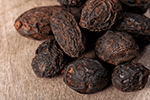
Saw palmetto extract is made from the fruit of the saw palmetto (see image). It is marketed as helpful for benign prostatic hyperplasia (BPH) or enlarged prostate. It is ranked as the third most used dietary supplement in the United States. However the FDA has not approved this supplement for any medical use. If you are going to purchase saw palmetto make sure that you buy one that is standardized and contains 85 to 95% fatty acids and sterols (this would include beta-sitosterol, stigmasterol, cycloartenol, lupeol, lupenone, and methylcycloartenol). These are considered the active ingredients.
Unfortunately the amount of plant sterols in saw palmetto is low. In clinical studies saw palmetto is unable to show any evidence that it actually works. Notable studies include one study where 396 men with enlarged prostate were followed for 18 months. Men were given either saw palmetto extract or a placebo (aka sugar pill). The results were disappointing and showed no difference in BPH symptom improvement between the men taking a placebo and those taking even high levels of the extract. Multiple studies, that were similar, have reached the same conclusion. The icing on the cake was an independent and thorough review by the Cochrane Database where studies with a total of 5,666 men reported the same lack of effectiveness. These studies and the following study confirmed that saw palmetto is not an effective remedy for enlarged prostate based upon the results published by: Bent S, Kane C, et al. "Saw palmetto for benign prostatic hyperplasia." New England Journal of Medicine, 2006; 354:557-66. For additional information see the button or link labeled "Saw Palmetto" (It may be to your left or below).
Beta-sitosterol in a Natural Prostate Formula
Beta-Sitosterol has been recommended by physicians in Europe for over 40 years as a natural enlarged prostate relief supplement to promote prostate health. Most manufacturers of prostate formulas here in the North America use beta-sitosterol sourced from the soybean or soy. They do this because it is less expensive and easy to find. There are two problems, one is that the Soybean contains the highest level of estrogen (the female hormone) of all plants. The second concern is that 93% of all soybeans grown in the USA and Canada are GMO (genetically modified) and the name of the soybean planted is the trademark Roundup Ready® Soybeans. Roundup® is the trademark for a herbicide (weed killer) known as glyphosate. The ingestion of estrogen from soy has been shown to reduce testosterone levels. The best choice is beta-sitosterol from pine which does not have estrogen. The following images illustrate the two choices well.
Beta-sitosterol from Soybeans
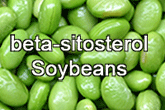
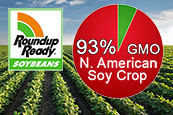

Beta-sitosterol from Pine

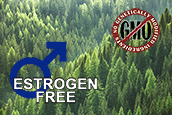
This is why Beta-sitosterol makes sense for an Enlarged Prostate.
* Helps to reduce waking at night due to constant urge to urinate*1
* Helps to Increase Urinary Flow and Promotes Healthy Urinary Function*2, 3
* Promotes a Healthy Prostate*2,3,4
* Beta-sitosterol has shown benefit in relieving the symptoms of an Enlarged Prostate* 4
* Many prostate supplements contain saw palmetto, Pygeum africanum, pumpkin seed oil, stinging nettles, and other plant compounds. The fact is that these ingredients have one thing in common and that is beta-sitosterol.
* Saw Palmetto itself contains a small amount of beta-sitosterol in comparison to the amount of beta-sitiosterol that is made available by manufacturers of beta-sitosterol. It is said that the amount of saw palmetto capsules required to achieve 300 mg of Beta-sitosterol would be in the hundreds.
1 (Bach D., Ebeling L. Long-term drug treatment of benign prostatic hyperplasia - results of a prospective 3-year multicultural study using Sabal extract IDS 89. Phytomedicine, 3:105-11, 1996)
2 (Berges R.R., Windeler J., Trampisch H.J., et al. Randomised, placebo-controlled, double-blind clinical trial of beta-sitosterol in patients with benign prostatic hyperplasia. Lancet; 345:1529–32, 1995)
3 (Klippel KF, Hiltl DM, Schipp B. A multicentric, placebo-controlled, double-blind clinical trial of beta-sitosterol (phytosterol) for the treatment of benign prostatic hyperplasia. Br J Urol 1997;80:427-32.)
4 (Wilt T, Ishani A, MacDonald R, Stark G, Mulrow C, Lau J. Beta-sitosterols for benign prostatic hyperplasia. Cochrane Database Syst Rev . 2000:CD001043.)
Red Clover (Isoflavones)
Red clover has been used as a natural remedy for a variety of conditions. Despite the use of isoflavones for post-menopausel hot flashes by women and those suffering with psoriasis the medical community is reserved about insufficient data on safety and adverse effects. Red clover is rich in isoflavones. The most common source of isoflavones is the soybean. As discussed above the soybean contains the highest levels of estrogen of all plants. This may explain why in some studies, that included women with a history of breast cancer, potential risks from a high intake of isoflavones has been identified. It should be noted that further clinical research to substantiate these risks. Aaron Katz, MD has done several studies with Red Clover Isoflavones and the results showed a decrease in BPH symptoms and an improvement in urine flow (Studies were paid for by the ingredient manufacturer). The symptom improvement noted was greatest in the first month. After the initial month the rate of improvement was notably reduced and slowed. Increasing the dosages was unremarkable with little to no improvement noted.
Rye Grass Flower Pollen Extract
In Europe, standardized pollen extract is the product of choice for inflammation of the prostate or prostatitis. The pollen extract is known for its anti-inflammatory properties. Men with prostatitis may have similar urinary symptoms like the symptoms common to enlarged prostate (BPH). Pollen extracts cause the bladder to contract and at the same time relax the urethra. Multiple studies have been published for pollen extract and prostatitis. A standard daily dose of pollen extract for prostatitis is about 500 mg daily in divided dosages.
Rye grass pollen and men with an enlarged prostate or BPH have experienced some benefit. One study, looking at 444 men with BPH over 24 weeks, in the Cochrane Database, demonstrated that rye grass pollen extract did not improve urinary flow rates or prostate size when compared with placebo. Despite the popularity of pollen extract it has never been shown to impact BPH symptoms in any large-scale clinical studies.
"You should not take pollen extracts if you are allergic to pollen. An allergic reaction can include shortness of breath, hives, and throat, tongue, or facial swelling. If you suffer allergies to grass, flowers, or other plants you should talk to your doctor before using pollen extracts."
Pumpkin Seed Extract
Pumpkin seeds contain beta-sitosterol. And we know that beta-sitosterol increases urinary flow and reduces urinary retention in the bladder. Pumpkin seed oil contains carotenoids and omega-3 fatty acids. Men who consume high levels of carotenoids in their diets have a reduced risk for BPH. Pumpkin seeds are also known to contain the mineral zinc. Pumpkin seeds are high in fiber and consuming large amounts may cause gas or bloating. Consuming a large amount of at one time may cause constipation. Pumpkin seed extract is rarely if ever taken by itself for enlarged prostate. Studies show a dosage range between 480 mg to 10 grams daily in divided dosages depending on the form of the ingredient. (oil, extract, seed)
Stinging Nettle
Stinging nettle has been used for thousands of years for both allergies and joint pain. This is due to its anti-inflammatory and antioxidant properties. Being a plant it likely has some plant sterols too. Some people have also used stinging nettle as a diuretic. Optimal dosages for stinging nettle have not been set for any condition. A limited amount of research shows that stinging nettle may be helpful for an enlarged prostate. However, experts have not determined what components in the plant have an effect on BPH. More research is needed to determine whether it is effective or not. It is never used alone for an enlarged prostate and therefore beneficial affects if any have not been confirmed and qualified for BPH.
Lycopene
Lycopene is a naturally occurring pigment often associated with tomatoes. But it is found in many fruits and vegetables. Generally the darker the color of pink or red in the fruit or vegetable, the higher its lycopene content. Lycopene is an antioxidant and one study suggests that it may slow the progression of BPH. To make any other claims for lycopene and BPH without additional quantitative research would be wrong and misleading.
Zinc
Zinc is an important mineral to the human body. Low zinc levels in adults can cause hair loss, diarrhea, loss of appettite, and affect a man's sexual desire. Chronic deficiencies in zinc have shown to increase the chance of developing BPH. Animal products provide most of the zinc in US diets. Adult males have a higher zinc requirement than females. This is because the prostate gland stores zinc and uses it to function. When zinc levels are high, testosterone levels are preserved and the activity of the enzyme that converts it to DHT (the secondary hormone that causes prostate enlargement) is reduced. It is difficult for men to maintain an adequate level of zinc due to the fact that men lose zinc in every seminal emission. Irving Bush, M.D (former chairman of the Food and Drug Administration panels on gastroenterology, urology and dialysis) stated that " few men obtain even the low US RDA of 15 milligrams of zinc a day." "Toxicity of zinc is very low. Side effects of diarrhea and anemia begin at about 500 mg daily, vastly more than anyone would need to take. (Even at that level, supplemental iron and copper alleviate the side effects.)"
The main reason zinc levels are low is due to bioavailability. This is the amount of zinc that available that the body can actually use. This is known as "elemental Zinc" and when manufacturers report this it allows for a more accurate calculation of percent daily allowance ( % Daily Value ). It ignores the zinc that the body is unable to use and that is considered irrelevant by the FDA. The FDA brought this to labelling of supplements in 2018 with compliance staggered into 2019. This bioavailability issue with zinc has been documented for over a decade. This is why individuals on vegetarian diets must compensate even when eating plants foods high in zinc (legumes, whole grains, nuts, and seeds) as they are also high in phytic acid which reduces the bioavailablity of usable zinc. The bioavailability of zinc is enhanced by dietary protein.
The Product Label and what it should tell you.
When you buy any health product that you swallow, you should confirm that it is manufactured in a registered or certified cGMP (good manufacturing practices) facility. This will ensure that the product you are using is being manufactured under strict U.S. FDA regulation. Compliance is ensured by periodic FDA inspection. The product label should state this. This protects you, the consumer. Every lot number produced is tested for quality and safety and that the ingredients meet the label claims. These are reviewed on FDA visits and samples are availble for random FDA testing and confirmation. Products with this are not found with fake lab reports on other websites.


This is why for over 10 years Customers keep choosing Best Prostate ®.
They want a healthy Prostate.
Beta-Sitosterol has been recommended by physicians for prostate problems in Europe for over 40 years.
They want Increased urinary flow and decreased trips to the bathroom and they want to increase intimacy!
They want Natural relief from the symptoms of an enlarged prostate so that they can sleep through the night.
Most of all they want Results without the side effects associated with prescriptions.
Best Prostate has No binders, fillers or unproven ingredients.
They want 310 mg of natural non-GMO Non-SOY Beta Sitosterol.
They are concerned about the estrogen in Soy-based beta-sitosterol.
They want a guarantee.
They don't want to sign up for automatic monthly billing of their credit card to get the best price.
It's simple, Best Prostate ® provides the essential ingredients to ensure you get the results you want and need. Other prostate formulas may have ingredients in addition to the key ingredients in our product, however we could not find clinical data or studies to support those additional ingredients and unproven fillers. You don't pay for those ingredients when you choose Best Prostate ®. We guarantee results and your satisfaction or simply return the product for a full refund. We encourage you to go the "Compare Formulas" tab on the left or below and scroll to the table to see the side by side view of your choices.
Each bottle contains 60 capsules, a 30 day supply
Best Prostate ® is manufactured at an NSF, GMP Registered facility, and/or cGMP certified facility in the USA. The facility is periodically inspected by the FDA for full compliance with FDA regulations.
Best Prostate ® Formula is a natural dietary supplement for the prostate. As a dietary supplement it has not been evaluated by the Food and Drug Administration (FDA). The product is not intended to diagnose, treat, cure or prevent any disease.
Each vegetable capsule contains 310 mg, US sourced BETA-SITOSTEROL
7.5 mg Elemental Zinc Citrate (26.6 mg Zinc Citrate)
15 mcg Selenium
Best Prostate ® contains (Non-Soy Non-GMO) Beta-Sitosterol which is the active plant sterol ingredient found initially in saw palmetto berries.
Try the natural prostate dietary supplement! As seen in Vitamin Retailer Magazine, June 2008, May 2009, and August 2009. Click image on left.
We guarantee your satisfaction and will refund your purchase price if you are not satisfied.
No "FREE" Auto-Shipping or automatic billing of your Credit Card to hassle with. You get results or your money back!
Best Prostate is avaliable at discount prices. We do not charge handling fees. We do charge actual costs for shipping. To see our prices or order click here:
Find out why plant sterols or beta-sitosterol have been relied upon for the relief of the symptoms of an enlarged prostate for decades.
* We use Vegapure® 867G which is a branded, non-GMO, line of plant sterols and sterol esters derived from pine trees. Vegapure® 867G is a product of BASF (Cognis Nutrition & Health). (For additional information regarding the beta-sitosterol in our product click on the "F.A.Q." (frequently asked questions) or "Whats in Best Prostate" button on the left.)
Best Prostate ® provides 620 mgs of (non-GMO) Beta-Sitosterol (source Pine trees) in a daily dosage regimen (2 capsules).
There is a lot of controversy regarding the consumption of soy by men. Rather than debate the benefits or lack of benefits, we use beta-sitosterol that is derived from pine. Due to the fact that most soy products in the US and Canada are GMO (93% per USDA). In addition, most soy products consumed in the US and Canada under go industrial processing which does not first, ferment the soy bean. This type of soy (non-fermented) has been shown to interfere with the absorption of zinc in addition to other minerals such as iron and calcium. The length of fermentation depends on the phytate content. In the case of soy, it takes about 6 months due to its high phytic acid content. Asians have traditionally consumed soy in these fermented forms such as soy sauce, miso and tempeh.
Best Prostate ® does not contain excessive amounts of Selenium and takes into account other daily dietary sources of Selenium. Vegetables are the major dietary sources of selenium in most countries throughout the world. Selenium can also be found in meats, fish, and seafood. Animals that eat grains or plants that were grown in selenium-rich soil have higher levels of selenium in their muscle. In the U.S., meats and bread are common sources of dietary selenium. Some nuts are also sources of selenium.
"Oct. 28, 2008 -- The National Cancer Institute has halted its $114 million study of whether vitamin E and selenium can prevent prostate cancer. They can't -- at least not in the formulations and dosages used in the study, called SELECT (SELenium and vitamin ECancer prevention Trial). The safety panel for the 35,000-man study called for a halt when an early look at the data showed no benefit for the treatment. The men received either vitamin E (400 milligrams) and selenium (200 micrograms), vitamin E and placebo, selenium and placebo, or placebos alone." News release, National Cancer Institute. National Cancer Institute: "Questions and Answers: Selenium and Vitamin E Cancer Prevention Trial (SELECT)," Oct. 28, 2008. WebMD
With Best Prostate one order is one order. There are no multiple shipments. We do not store your credit card information. It is recommended that you only purchase one bottle of the Best Prostate Formula if you are trying our product for the first time. 98% of the men who try Best Prostate do see some improvement while taking the first bottle. After you know Best Prostate works for you most men will order either 3 or 6 bottles to save with our quantity pricing.
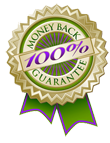


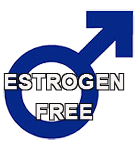






The symptoms of an enlarged prostate or BPH
These symptoms can include:
• hesitant, interrupted or reduced urinary stream
• feel the urgent need to urinate but can't
• feel that you never completely empty your bladder
• feel the need to urinate less than 2 hours after you finished urinating
• feel that you push or strain to begin urination
• have the urge to awaken and urinate multiple times at night
• experience decreased desire and/or sexual dysfunction
Fortunately tens of thousands of men have discovered that the natural ingredient beta-sitosterol can actually address these symptoms without the side effects of prescription medications.
Prostate Facts:
Proscar®, the leading pharmaceutical drug for treating prostate problems, is associated with sexual dysfunction and male breast enlargement.
Flomax®, a pharmaceutical drug for treating prostate problems, is associated with both nasel congestion and cough (incidence is double that of placebo).
Saw palmetto is not an effective remedy for enlarged prostate based upon information published by: Bent S, Kane C, et al. "Saw palmetto for benign prostatic hyperplasia." New England Journal of Medicine, 2006; 354:557-66.
1. Issa M, Marshall F. Contemporary Diagnosis and Management of Diseases of the Prostate. 3rd ed. Newtown, Pa:Handbooks in Healthcare Co; 2005.
2. Contemporary Urology/Urology Times 2005 Fact Book. Prepared by Advanstar Medical Economics Healthcare Communications Secondary Research Services.
3. American Urological Association Education and Research, Inc. Guideline on the Management of Benign Prostatic Hyperplasia (BPH). 2003.
Important Facts to know about Prostate Health
To begin you are a male and all males have a prostate. Second all males produce and have testosterone (the male hormone). Testosterone is responsible for increased body cell mass (muscles) as compared to women. It is also the key to the male sex drive or libido. All men have an enzyme that can convert testosterone into DHT (dihydro-testosterone). Unfortunately this enzyme tends to become more active once men near 50 years of age. This is precisely when you can not afford to lose vital muscle mass due to low testosterone. Sometimes this enzyme becomes active earlier and for others it may be years later. When this secondary hormone DHT increases in our body men can experience: hair loss ( male pattern baldness), prostate enlargement, or a combination of the two. Since testosterone was the fuel for this active enzyme generally testosterone levels decrease and men can experience less energy, fatigue, loss of libido, erectile dysfunction.
Prostate enlargement is becoming increasingly common as men are living longer lives. About 30 million men suffer from benign prostatic hypertrophy (BPH). BPH is the most common disorder of the prostate1 and it is the most common diagnosis by urologists for male patients age 45-74.2 There is a 50 percent chance that you will have prostate problems or symptoms by the time you are 60.3 Each year more than 500,000 men in North America have prostate surgery; and more than a billion dollars a year is spent on the treatment of prostate problems. Prostate surgery often results in both incontinence and impotence and can result in men living a life without sexual intercourse.
Warning: "TOP PRODUCT"/ REVIEW WEBSITES / PILL REPORTS
Education is the key to understanding your prostate and what makes the best natural prostate relief formula. Unfortunately many consumers search for the truth and instead find disguised and misleading advertisements that look like the answer. "Top 10 prostate formulas of year ", "Top 5 prostate products", PillReports, and even paid celebrity endorsers with prostate product lab reports that do not have product lot numbers. A lab report with a product name and without a lot identification number is useless and suspect. The lot number is only way for anyone to confirm if any of the information being presented is actually true or false and fake. The sad truth about these websites and consumer reports is that they all have one goal. It has nothing to do with the truth it has to do with making money. Everyone who visits these sites needs to first look for the "Disclosure"or "FTC Disclosure"this is a legal requirement of these websites. You may click on these words above which are links to actual examples that demonstrate actual disclosures. Sadly the sites with great "Shocking Headlines" are owned by the manufacturers of the products that they claim are the best and ranked as number one.
Nature has given us a natural remedy to support good prostate health.
Best Prostate ® is the all natural Prostate Formula. Unlike all tablets and caplets contain at least one or more of the following ingredients that require binding and lubricating agents in there manufacturing process. There is nothing natural about DiCalcium Phosphate, Stearic Acid, Magnesium Silicate, Magnesium Stearate (Talc), synthetic silica products, or Glaze. Note Silicon dioxide is a natural ingredient that is abundantly found in nature. Best Prostate ® uses a 100% vegetable capsule in its manfacturing process!
Other prostate formulas attempt to confuse the consumer with false claims, negative advertising, false treatment claims, and misinformation. We feel that these practices are unprofessional, inappropriate and unethical. We encourage consumers to report these deceptive practices to The Federal Trade Commission. For additional information regarding this click here. Beware of "FREE" offers that sign you up for auto-shipment and credit card billing scams.
Attention: The statements made on this web site have not been evaluated by the Food and Drug Administration (FDA). The products featured are not intended to diagnose, treat, cure or prevent any disease. Any medical concerns should be directed to a qualified health care professional.
You are protected by the FDA "Dietary Supplement and Nonprescription Drug Consumer Protection Act" Please visit: www.fda.gov
Our compliance with this Act can be found at: http://www.imsnaturally.com/contact_us.php








